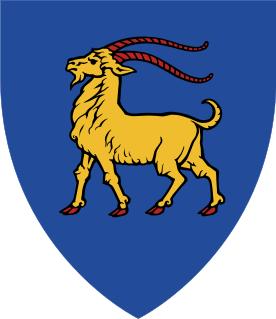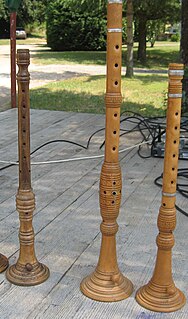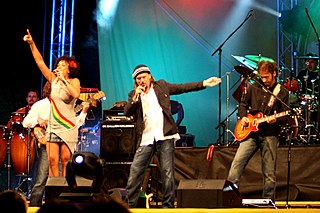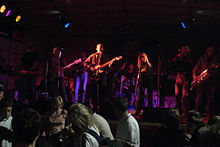
Istria, formerly Histria (Latin), Ίστρια, is the largest peninsula within the Adriatic Sea. The peninsula is located at the head of the Adriatic between the Gulf of Trieste and the Kvarner Gulf. It is shared by three countries: Croatia, Slovenia, and Italy. Croatia encapsulates most of the Istrian peninsula with its Istria County.
A roots revival is a trend which includes young performers popularizing the traditional musical styles of their ancestors. Often, roots revivals include an addition of newly composed songs with socially and politically aware lyrics, as well as a general modernization of the folk sound.
The music of Croatia, like the divisions of the country itself, has two major influences: Central European, present in central and northern parts of the country including Slavonia, and Mediterranean, present in coastal regions of Dalmatia and Istria.

"Istrian scale" refers both to a "unique" musical scale of folk music genres from Istria and Kvarner which use the style. It is named for the Istrian peninsula. Istrian folk music is based on a distinctive six-tone musical scale, and the peninsula's two-part, slightly nasal singing. The two-part singing and playing in the Istrian scale, a traditional singing practice characteristic of the Istrian region and the north Adriatic coastal area and islands, was inscribed in UNESCO's List of Intangible Cultural Heritage in 2009.}}

Chakavian or Čakavian is a South Slavic regiolect or language spoken primarily by Croats along the Adriatic coast, in the historical regions of Dalmatia, Istria, Croatian Littoral and parts of coastal and southern Central Croatia. Chakavian, like Kajkavian, is not spoken in Serbo-Croatian-speaking regions beyond Croatia.

Fairport's Cropredy Convention is an annual festival of folk and rock music, headed by British folk-rock band Fairport Convention and held on the edge of the village of Cropredy in Oxfordshire, England. The festival has taken place in August annually since 1976.

Vlado Kreslin is a Slovenian singer-songwriter and folk rock musician.

Prljavo kazalište is a rock band from Zagreb, Croatia. Since its formation in 1977, the group changed several music styles and line ups but remained one of the top acts of both the Croatian and Yugoslav rock scenes.

Parni Valjak is a Croatian and former Yugoslav rock band. They were one of the top acts of the former Yugoslav rock scene, and currently one of the top rock-and-roll bands in Croatia.

Motovun is a village and a municipality in central Istria, Croatia. In ancient times, both Celts and Illyrians built their fortresses at the location of present-day Motovun. The name of the village is also of Celtic origin, derived from Montona, meaning "a town in the hills". The population of the village itself is 531, with a total of 983 residents in the municipality (2001); 192 of the residents speak Italian as their mother language. The Parenzana, a narrow-gauge railroad that ran from Trieste to Poreč/Parenzo between 1902 and 1935, passed below the town.
Tonči Huljić is a Croatian musician, songwriter and music producer.

Jugoton was the largest record label and chain record store in the former Yugoslavia based in Zagreb, SR Croatia.
New wave in Yugoslavia was the new wave music scene of the Socialist Federal Republic of Yugoslavia. As its counterparts, the British and the US new wave, from which the main influences came, the Yugoslav scene was also closely related to punk rock, ska, reggae, 2 Tone, power pop and mod revival. Some of its acts are also counted as belonging to the Yugoslav punk scene which already existed prior to new wave. Such artists were labeled as both punk rock and new wave.

The sopile is an ancient traditional woodwind instrument of Croatia, similar to the oboe or shawm. It is used in the regions of Kvarner, Kastav, Vinodol, Island Krk, and Istria. Sopile are always played in pairs so there are great and small or thin and fat sopila. Sopile are musical instrument of sound very interesting possibilities and very piercing special sound. This is replicated in more modern examples of Kvarner music through use of modified double reed clarinet or soprano Dulzaina. Sopile are, by "mih" and "šurle," today very popular in folk tradition of Istria, Kvarner and Island Krk.

Maartin Allcock was an English multi-instrumentalist musician and record producer.
Popular music in Yugoslavia includes the pop and rock music of the former SFR Yugoslavia, including all their genres and subgenres. The scene included the constituent republics: SR Slovenia, SR Croatia, SR Bosnia and Herzegovina, SR Montenegro, SR Macedonia and SR Serbia and its subunits: SAP Vojvodina and SAP Kosovo. The pop and rock scene was a part of the general Music of Yugoslavia, which also included folk, classical music, jazz etc. Within Yugoslavia and internationally, the phrases ex-YU or ex-Yugoslav Pop and Rock both formally and informally always refers to the SFRY period only, not including Federal Republic of Yugoslavia (1992–2003).
The Croatian music festivals are a series of music festivals which showcase the top Croatian musical acts, in both traditional and contemporary music. They usually involve live performances as well as awards given by festival jurors as well as from the fans. The majority of the festivals release a compilation of the songs entered.

Croatian popular music is the popular music of Croatia.
The gunjac or bajs is a violoncello-like Croatian instrument but with only two strings. Gunjac instrumentalists are called bajsisti. It is a double bass string instrument played with a bow.
Croatian dance traditionally refers to a series of folk-dances, the most common being the kolo.












